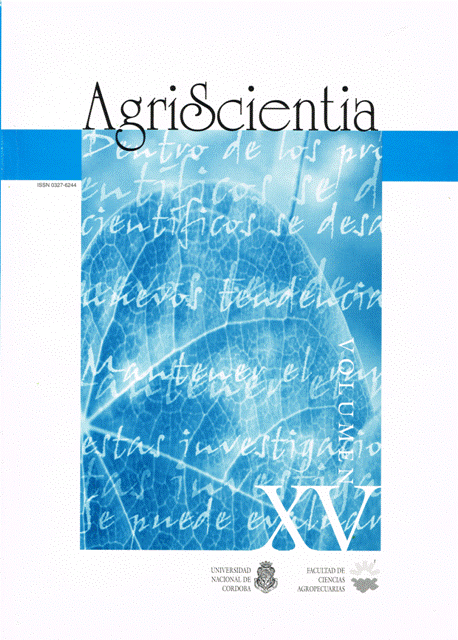Direct and indirect responses to selection for meiotic index trait in hexaploid triticale
Main Article Content
Abstract
Triticale (Triticosecale Wittmack) is a man-made aloploid species with reproductive problems inherent to those individuals containing two or more genomes in a common nucleus and with the stabilization process in course. These problems act on several morphophysiological (i.e. number of seeds per spike or spikelet) and cytological (normal tetrade percentage) traits, that are conspicuous evidences about the existence of these problems. The objective of this study was: to determine the direct response to selection for the meiotic index and that indirectly achieved through the spikelet fertility. Sixty F₂:₃ derived families were evaluated in 1997, thirty per each selection criteria analyzed (meiotic index and spikelet fertility) and fifteen per group with superior and inferior values for each one. The Multiple Range Duncan's Test showed significant differences (P ≤ 0.05) between superior and inferior meiotic index group mean values. In conclusion, the meiotic index character is heritable, and it is possible to improve it through a plant breeding program.
Article Details

This work is licensed under a Creative Commons Attribution-ShareAlike 4.0 International License.
How to Cite
References
Falcao, T. M. M., M. I. B. Moraes-Fernandes and M. H. B. Zanettini, 1990. Genotypic and environmental effects on chromosomal abnormalities in hexaploid triticale grown in Southern Brazil and correlation between meiotic behaviour and fertility of progenies. In: Proceedings of the 2nd International Triticale Symposium. Mexico, D. F. CYMMIT: 320-328.
Gustafson, J. P. and C. D. Qualset, 1975. Genetics and breeding of 42-chromosome triticale. II. Relations between chromosomal variability and reproductive characters. Crop Sci. 15: 810-813.
Hsam, S. L. K. and E. N. Larter, 1973. Identification of cytological and agronomic characters affecting the reproductive behaviour of hexaploid triticale. Can. J. Genet. Cytol. 15: 197-204.
Manero de Zumelzú, D., A. Ordóñez, L. Torres and R. Maich, 1992. Meiotic irregularities in hexaploid triticale (Triticosecale Wittmack). Variability analysis. Cereal Res. Commun. 20 (1-2): 125-130.
Manero de Zumelzú, D., R. Maich and A. Juarez, 1995. Cytological disorders in hexaploid triticale (Triticosecale Wittmack). Association and stability between two indexes. Cytologia 60: 303-305.
Merker, A., 1971. Cytogenetic investigations in hexaploid triticale. I. Meiosis, aneuploidy and fertility. Hereditas 68: 283-291.
Ochoa de Suárez, B., D. Manero de Zumelzú and R. Macchiavelli, 1987. Citogenética de triticales. Aberraciones meióticas en triticales hexaploides. Rev. Cs. Agrop. V: 135-144.
Ordóñez, A., L. Torres, R. Maich and D. Manero de Zumelzú, 1998. Genotype and GxE interaction effects on meiotic irregularities in hexaploid triticale (Triticosecale Wittmack). In: P. Juskiw (ed.), Proceedings of the 4th International Triticale Symposium, Canadá, Vol. 2, pp. 279-281.
Szpiniak de Ferreira, B., 1983. Relación entre fertilidad e índice meiótico en 8 cultivares de triticale (Triticosecale Wittmack). Mendeliana VI (1): 43-54.
Tsvetkov, S. M., 1996. Study of hybrids between 2n = 6x = 42 triticale forms. I. Investigations in F2. In: H. Guedes Pinto (ed.), Triticale: Today and Tomorrow, The Netherlands, pp. 173-178.





